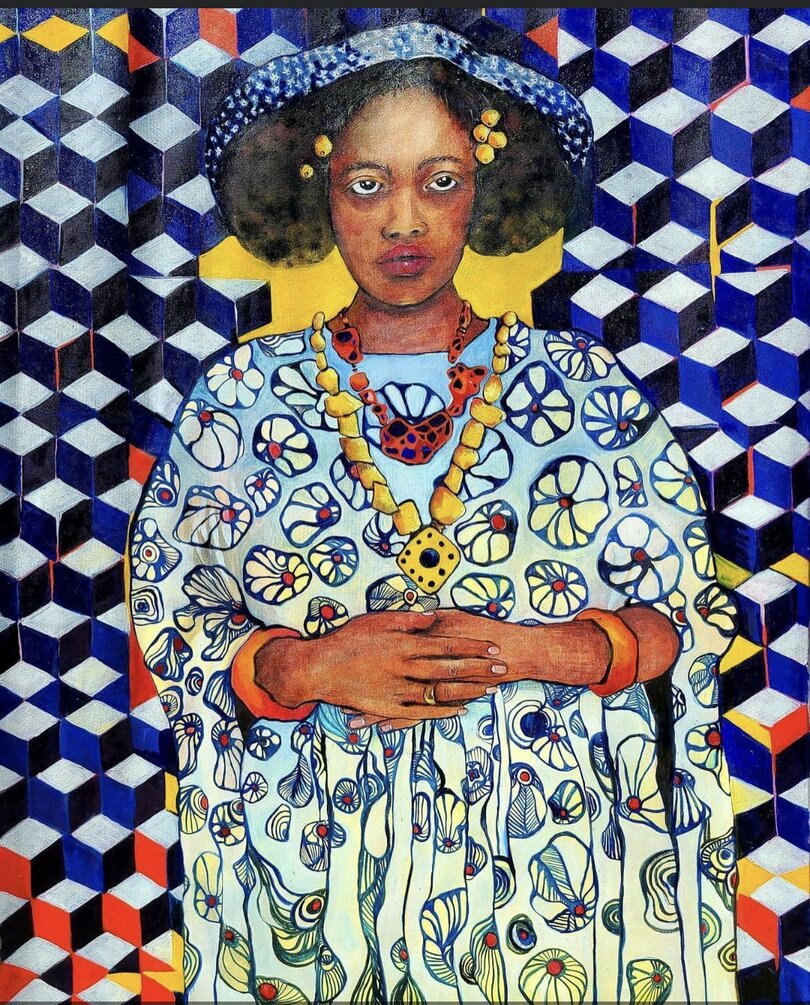MLK Art Gallery celebrates Black artists, identity

Courtesy of Rochele Royster
One of Rochele Royster’s pieces included in the exhibit is “Fractured Expectations,” pictured above. For Royster, the exhibit is a special opportunity to celebrate Black artists and leaders in the community.
Get the latest Syracuse news delivered right to your inbox.
Subscribe to our newsletter here.
When Melquea Smith began illustrating for children’s picture books, she realized the severe lack of Black representation in their stories. She understood that authors weren’t including Black representation to the extent she was, and wondered whether her career could become sustainable.
“One thing I want to convey through my work is showcasing Black girls and Black women,” Smith said. “As I’m exploring my Black identity, I’m able to put that out in the way I see the world too.”
On Jan. 21, Smith’s art will be on display in the MLK Art Gallery, an interactive addition to the 39th annual Rev. Dr. Martin Luther King Jr. Celebration in Club 44 of the JMA Wireless Dome. Centered on the event’s theme of “The Reach of the Dream,” the exhibition will showcase the multi-media talents of seven local Black artists.
Rochele Royster, featured artist and College of Visual and Performing Arts professor, said it’s nice to be in an exhibit with other Black artists who create amazing art in their daily lives. It means a lot to be part of an SU-hosted event that is celebrating King and Black leaders in the community.
Royster was raised by parents who both worked at schools in the Washington, D.C., area. Due to their involvement in the education system, she lived a childhood surrounded by art created by their school’s art teachers.
As Royster began experimenting with various artistic mediums, she drew inspiration from her mother and father’s activism in a teacher’s union. She was also motivated by her great-grandmother, an avid quilter and native of North Carolina.
“Seeing her get little scraps of things from clothes, collect these found objects and create these beautiful quilts really inspired my artistic practice,” Royster said. “Art should be not only something that is culturally relevant but something that is also practical.”
Royster said she often employs a gaze motif – direct eye contact with the art’s figure and clusters of patterns to draw the viewer into the piece. Much of her art surrounds her family history and self expression through creation. Her piece “Fractured Expectations” highlights this connection to her Black heritage.
“I like looking at how resilient we are as a people despite the atrocities and despite the clutter and chaos of the world around us that we can still persevere,” Royster said. “We wouldn’t know joy if it wasn’t pain. We couldn’t be calm if there wasn’t disruption but persevering through that is important.”
Beautiful and graphic, ornate and organic, the idea of making something out of nothing resonates with her, Royster said. Similarly, Smith said art has always been something she knew was a part of her life and something she would always have a connection with.
Smith grew up in the Syracuse area and easily adapted to SU’s community. In high school, she became involved with the university through various routes, including the Science and Technology Entry Program, a music and sound prep production class with Professor Cedric T. Bolton and a science bowl in 2009.
Illustrating ultimately became Smith’s passion. Everything she creates is a chance to “put her own spin” on the work. She appreciates the chance to draw Black characters in different ways, showcasing Black girls with beads in their hair rather than the two puffs she usually sees in illustrations.
“I do my best to showcase the intersectionalities of Black kids,” Smith said. “This is something I want to do for pretty much the rest of my life. So I have to be cognizant and deliberate about what I decide to illustrate and how.”
Traditionally published picture books are a wide-scale form of entertainment, Smith said. Even if her work is a drop in the water, she still sees it as a positive way to showcase Black kids and other children of color.
Professor David MacDonald, a ceramicist and former SU faculty member, is also an artist featured in the MLK Art Gallery. While a student at Hampton University, a historically Black university, his work explored the Civil Rights Movement and the ongoing social circumstances of the period.
His work is inspired throughout college and beyond by his African heritage. He explored his connection with his heritage through his experiences attending an HBCU.
Royster also went to an HBCU, Virginia State University. Throughout her years there, she was taught by professors who learned from people during the Harlem Renaissance. She learned how to use art as a therapeutic and healing act of expression.
“Resilience is a big thing in my work,” Royster said. “Getting lost in the clutter and chaos but understanding that that is all part of life.”
For MacDonald, art is more than just expression. It’s a vehicle for him to explore his heritage and amplify Black stories. This exhibit is an opportunity for him and the other artists included to share their journeys with the SU community.
“I definitely love this notion of ‘we are not a monolith,’ and being able to showcase identities in all different fashions,” Smith said.





